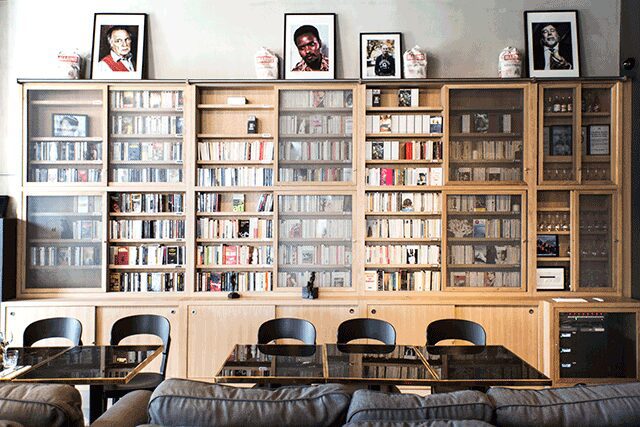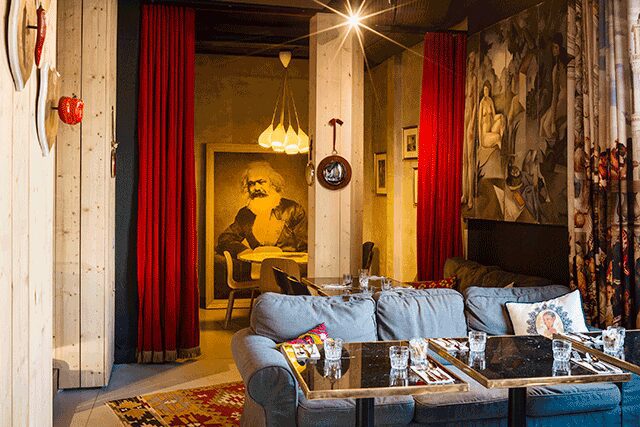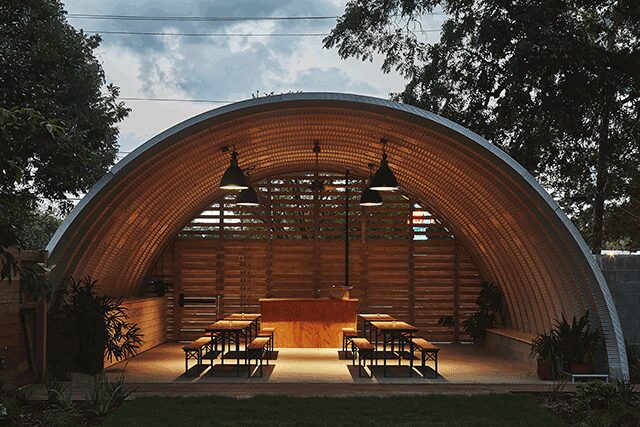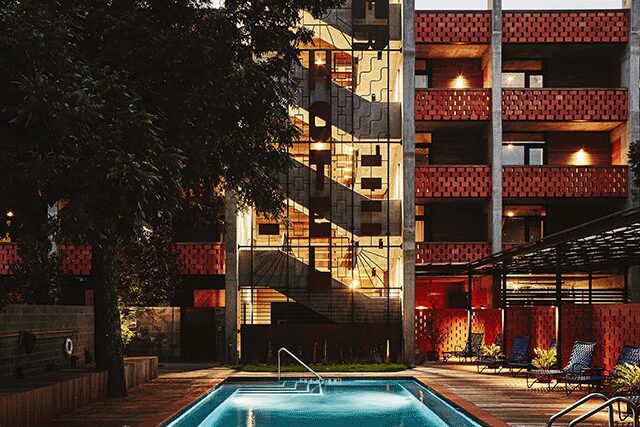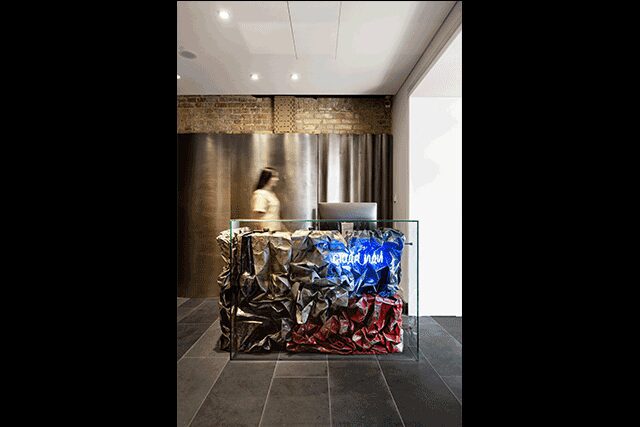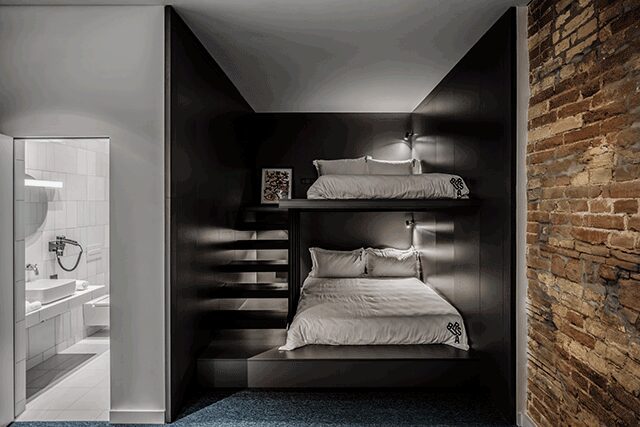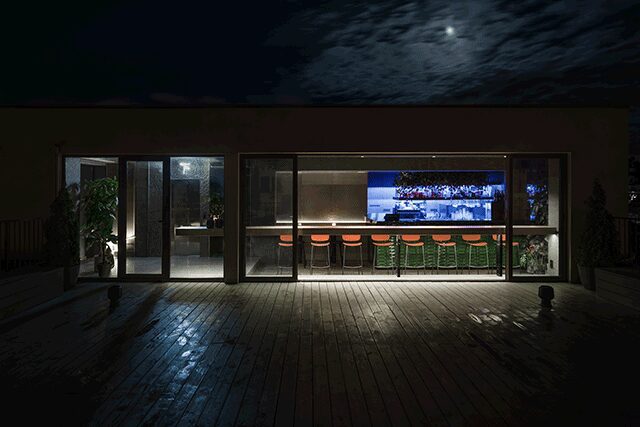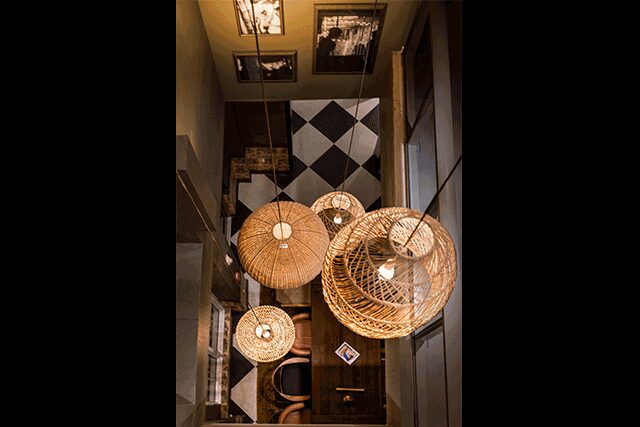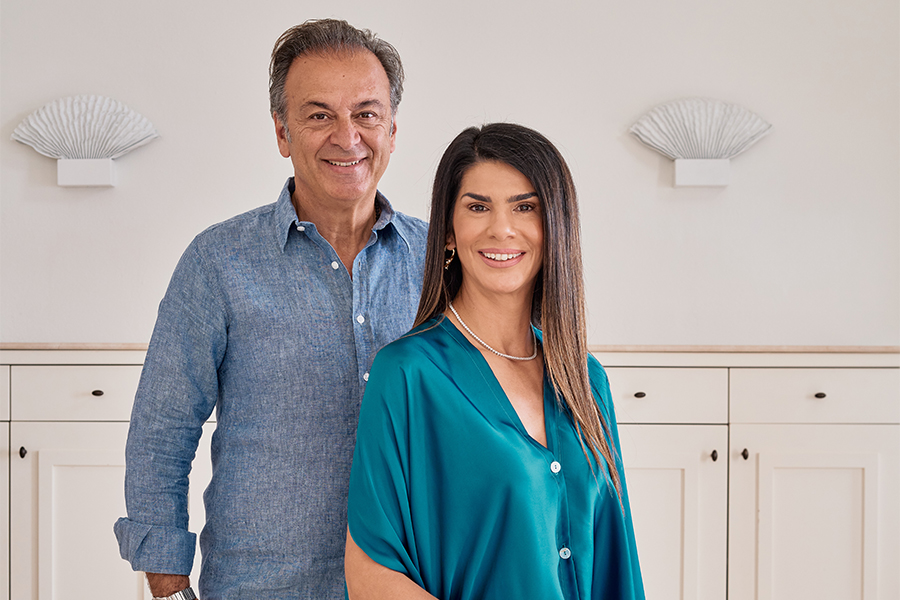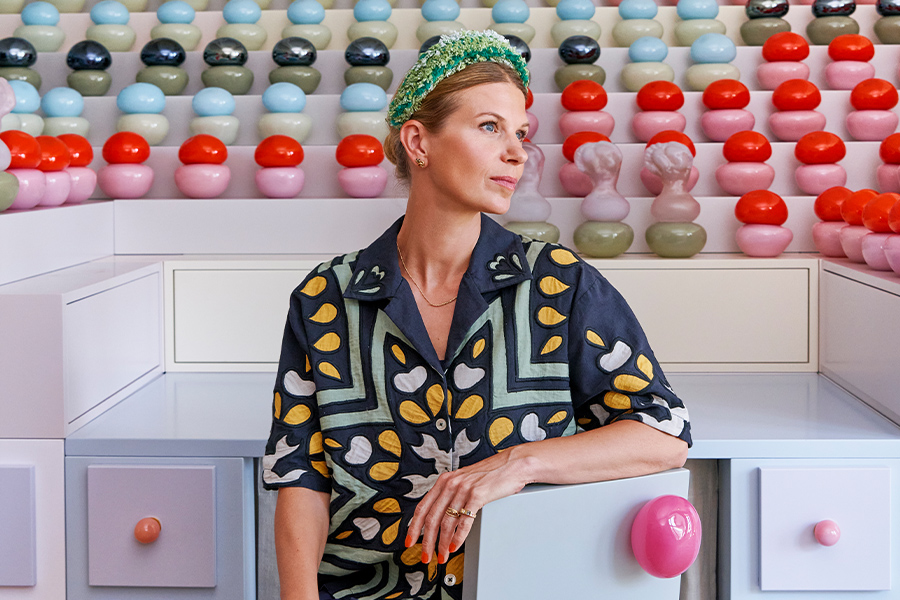Lyon Porter
Urban Cowboy
Lyon Porter wasn’t supposed to be the enterprising real estate guru and budding hotelier he is today. As a former professional hockey player, Porter lived in 15 cities in 10 years until he was 26 years old—a feat in itself, but one that quickly turned stale. In 2006, he said goodbye to a life on the ice and road and moved to New York to start a career in real estate.
He became one of the top brokers in the city, soon developing a passion for interior design after rehabbing a handful of buildings into liveable, rentable units. In 2013, Porter bought a townhouse in Williamsburg, Brooklyn and his creative process began to take shape. “I find that an old building is a lot like a leather jacket, the more you beat it up, the better it feels,” he says about the worldly yet rustic ambiance of his first property, the boutique bed and breakfast Urban Cowboy.
A few years later, he moved south to open a second, larger location in a Victorian home in Nashville. “We design for ourselves, but at the same time, we cannot take ourselves too seriously,” says Porter. Along with his partner in business and life, Jersey Banks, the duo recently opened their third property, Dive Motel, a former roadside motel in Nashville that leans into the midcentury era with wood paneling, vintage vinyl wallcoverings, and disco balls.
In their largest undertaking yet, Porter and Banks are completely overhauling a turn-of-the-century Bavarian-style inn in Big Indian, New York. Opening later this year as Urban Cowboy Catskills, the property will feature 29 guestrooms dispersed throughout five buildings, along with a communal main lodge, all set on 68 acres with two rivers running through it. Porter says the biggest draw upstate will be two-fold: it’s the type of place where guests will want to sit around a campfire and have real conversations and it’s completely off the grid with cell service being dicey, at best. “The word authentic is so overused, but people can feel when they are someplace special,” he says, summing up what they are trying to accomplish throughout all of their properties. “They always know when there is soul in the sauce.”
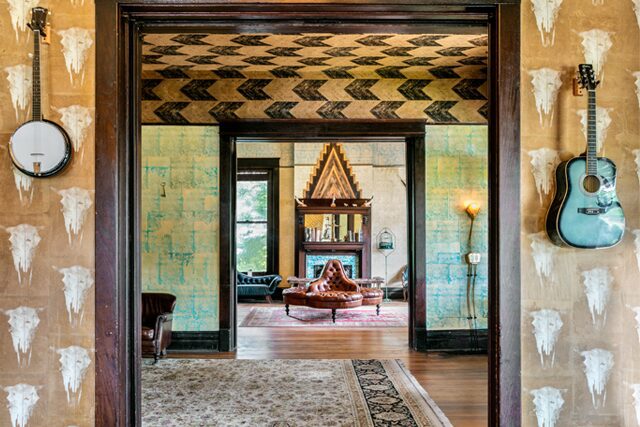
Guitars punctuate the rustic public space of Urban Cowboy Nashville
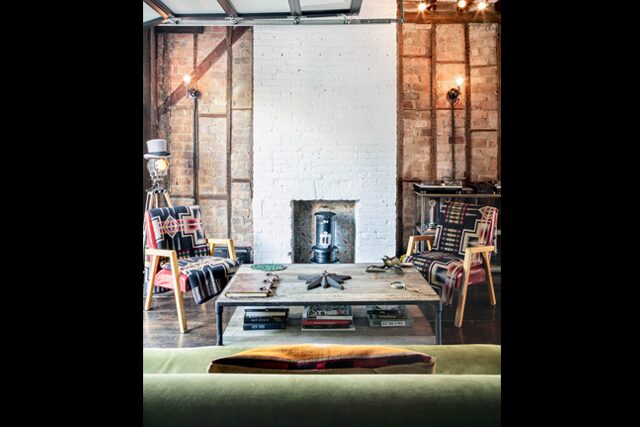
A garage door opens up to a parlor at Urban Cowboy Brooklyn in Williamsburg
Cyril Aouizerate
MOB
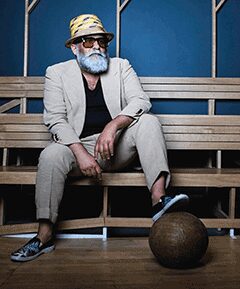
For philosopher-turned-hotelier Cyril Aouizerate, a chance meeting with French billionaire and real estate developer Alain Taravella changed his life. Working as Taravella’s right hand over the course of five years, he not only learned how to develop urban projects, but how to inject spaces with a distinct worldliness. Enter Mama Shelter, the boutique budget brand Aouizerate founded alongside the Trigano family in 2007. At the time, it changed the industry with its affordable yet design-driven interiors.
MOB Hotels is Mama Shelter 2.0, mixing the budget-friendly brand’s aesthetic with Aouizerate’s avant-garde sensibility. An amalgamation of a traditional hotel and community hub, his first 92-room property opened in 2017 next to the Marché aux Puces flea market in Paris, followed by a Lyon location the same year (designed in collaboration with Philippe Starck).
Aouizerate describes the concept as both radical and subversive, challenging the norm with large common spaces that act as a salon of sorts meant to engage creative and socially aware thinkers. “We are first and foremost cultural actors,” he says. “My role is to create the conditions for a theater of life in our hotels.”
In the Paris location, for example, Aouizerate collaborated with fair-trade fashion school Casa 93—fashion designer Jean-Paul Gaultier and Adidas have also collaborated on projects with the school —which trains talented young people from underprivileged neighborhoods. Now in its second year, it exemplifies the French hotelier’s goal to create a product that is a “genuine catalyst for progress rather than a marketing ploy,” he says.
MOB’s inaugural U.S. hotel will land in Washington, DC in 2020, followed by another in Los Angeles in 2022. For now, two new concepts are in the works: the mixed-use, extended stay MOB House, opening next year in Paris with a design from Starck, and the resort-style Villa MOB, all with the same welcoming and open-minded approach at their core. “For those who struggle to express an often iconoclastic vision of life,” he says, “MOB serves as a sanctuary and a place of expression.”
Jen Turner
The Mighty Union
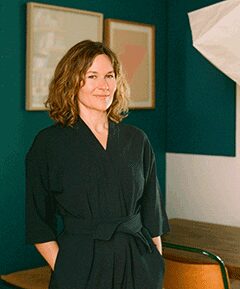
Partners Donald Kenney, Jack Barron (former Ace Hotel Group co-owner), and Barron’s wife, architect Jen Turner, prove three isn’t a crowd, but the perfect alliance when it comes to crafting immersive, design-forward hotels and restaurants. Not only that, the aptly named the Mighty Union has a knack for tackling complex, historical preservations that others would perhaps deem unsalvageable and overlook. Still, “we tend to have to fall in love with the site, whether it’s the building, its history, or both,” before taking on a project, Turner says.
Case in point: the transformation of the Local 1266’s Carpenters Union Hall into the charming, vintage-inspired Carpenter Hotel last year. Situated within a peaceful pecan tree grove in downtown Austin, the low-slung, yellow-brick building built in 1948 “was a typical example of old Austin,” Turner says, which she enhanced with handmade terracotta blocks sourced nearby in San Antonio for the new hotel structure. “We wanted it to feel like it had always been there,” she says. The terracotta façade continues inside and contrasts the concrete frame and flooring in the 93 richly colored guestrooms. Downstairs, reality TV host Andrew Knowlton and his wife, Christina, head up the F&B program, which includes the casual Carpenter Hall located in the old hall and helmed by chef Grae Nonas.
In addition to the rustic 11-room Suttle Lodge with cabins and a lake house in Oregon (the ambiance recalls “your crazy uncle’s weekend house,” says Turner), the company is working on a conversion of a former market, restaurant, and banquet hall into a boutique hotel in Honolulu, as well as an 82-room property in San Antonio, both breaking ground this year. Each, Turner says, will celebrate the “personal and passionate approach” the emerging hotel company has made its hallmark.
Vasily Grogol
Bursa Hotel

At only 14, the Moscow-born Vasily Grogol began his career in hospitality, doing odd jobs in the industry until attending hospitality management school at the Glion Institute of Higher Education in Switzerland. After graduation, he spent two years in New York working with SIXTY Hotels and conceiving Bursa, an art-focused hotel brand that opened its first location in Kiev in May 2018.
“I have always been into art, music, and film, and I want to create places that are going to connect artists and visitors,” says the 24-year-old hotelier. “That’s the idea of Bursa; it’s for everybody. It’s for the guy in the suit and the cool hipster. Here, they can have breakfast, party at the bar, and live under one roof together.”
The inaugural property comprises two historic buildings (the oldest, dating back 200 years, was the former home and workplace of famed 18th-century architect Andrey Melensky) and a modern block. With 33 rooms, a rooftop bar, and ground-floor restaurant Beliy Shum, local designer Slava Balbek of Balbek Bureau crafted the hotel with a Bauhaus spirit, complete with concrete floors and exposed brick. “It has a lot of plain colors like white and gray, but then there are those big splashes or brushstrokes of color,” says Grogol.
The crux of the hotel, however, is the nonprofit Bursa Gallery, which is dedicated to promoting Ukrainian artists with the goal to someday evolve into a contemporary art museum. Indeed, throughout the hotel, art takes centerstage. Take the cozy lobby, where the striking front desk from a local artist boasts a bent metal exterior in a nod to 20th-century French sculptor César Baldaccini.
As Grogol plans Bursa’s future—he’s in the building search phase for a property in Athens, Greece—he’s also expanding his universe in Kiev with coworking and co-living concepts. “My ambitions are pretty big,” he admits. “I want to see more hotels opening in other destinations, but hotels are also a part of this whole movement of co-sharing, and that’s where I want to grow.”
Rami Zeidan
Life House

Cutting his teeth at industry powerhouses such as Starwood Capital Group and the Sydell Group, Rami Zeidan became seasoned in boutique and luxury hotels before joining tech entrepreneur Yury Yakubchyk to create the first Silicon Valley-backed hospitality group in the U.S. Their mission: to effortlessly fuse design, technology, and the guest experience while keeping cultural enrichment top of mind with affordable boutique accommodations. At the heart of it, Zeidan says, is to bring “locally rooted experiences to travelers who want this at a more accessible price point.” To that end, Life House has emerged with authentically crafted properties that are “responsive to the market” in terms of the evolving landscape, offering notable amenities like a culturally rich art program and a mobile app that allows guests to unlock their room by phone and connect with other guests before or during their stay.
For the budget-friendly lifestyle brand’s first outpost in Miami’s vibrant Little Havana neighborhood, the in-house design team restored a dusty pink 1920s-era Mission Revival mansion, formerly the Jefferson Hotel, through a “well-traveled expeditionist lens,” says Zeidan, “to celebrate the neighborhood’s melting pot of Latin cultures that often gets overlooked.” Some of the 33 rooms encourage group and family travel with full-size bunkbeds, while the F&B program is robust with street food cuisine evocative of an “Anthony Bourdain narrative,” says Zeidan. “He said something quite profound, ‘Travel is not reward for working, it’s education for living,’ and that’s what our brand is all about.” In addition to the newly debuted South Beach property that stands out from the typical scene with an eclectic beach cottage vibe, locations in Miami’s Mid-Beach, Brooklyn’s Bushwick neighborhood, and Denver are still to come.

